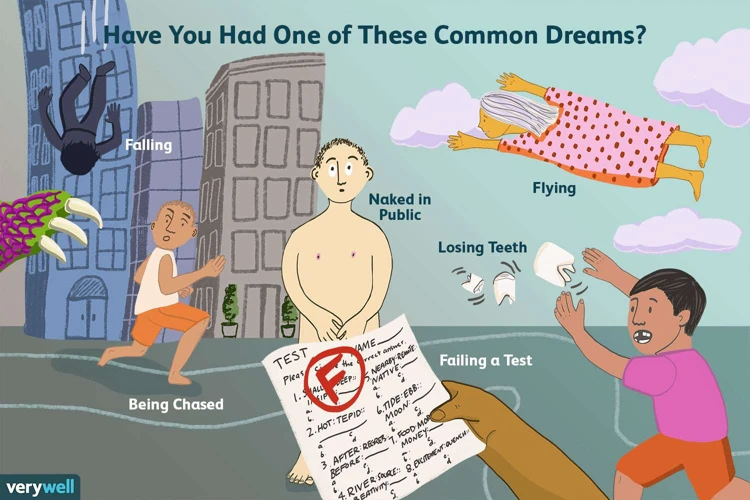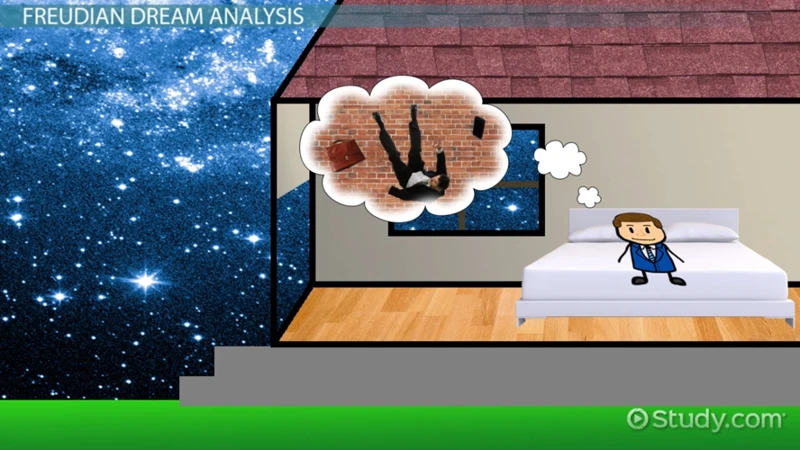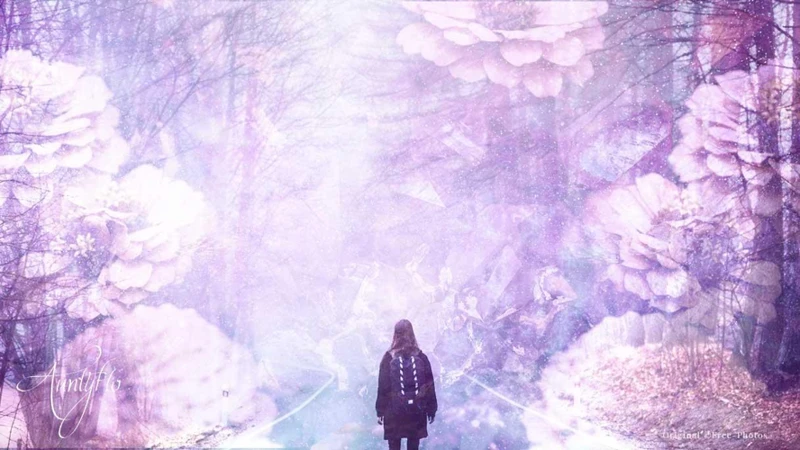Every night, as we slip into the realm of dreams, our minds become vehicles for exploration, our spirits released from the confines of reality. Dreams hold a profound significance in our lives, serving as gateways to the unconscious and windows into our deepest desires, fears, and emotions. They often mystify us with their vivid and enigmatic symbolism, providing valuable insights into our waking lives. In this article, we embark on a journey of unraveling the spiritual meaning behind one of the most perplexing dream scenarios: getting lost. Join us as we decode the symbolism of this disorienting experience, exploring its metaphorical implications, interpreting different settings and emotions, and ultimately unlocking the wisdom and guidance that lie within our dreams.
The Significance of Dreams

Dreams have long fascinated and puzzled humanity, with their mysterious and symbolic nature. They serve as portals that grant us access to the depths of our unconscious mind, unveiling hidden desires, fears, and emotions that elude us in waking life. Through dreams, we gain glimpses into the intricate tapestry of our psyche, unraveling the complexities of our being. These nocturnal journeys are not haphazard realms of chaos but rather, contemplative landscapes where the subconscious mind weaves intricate narratives. Dreams can provide profound insights, offering guidance, warnings, and messages that can shape our waking existence. Whether it’s a recurring dream of falling, encountering unfamiliar faces, or getting lost in unfamiliar surroundings, every dream is an opportunity to delve into the rich symbolism and unravel the enigma of our own subconscious minds.
1. Dreams as Windows to the Unconscious
– Dreams act as windows to the unconscious, granting us a glimpse into the hidden recesses of our minds. They provide a pathway for our subconscious thoughts, desires, and fears to manifest in symbolic and metaphorical ways. Through dreams, our deepest emotions and unresolved conflicts are brought to the surface, allowing us to explore and understand them in a safe space. This profound connection between dreams and the unconscious offers an opportunity for self-reflection, introspection, and personal growth. Whether we find ourselves flying through the skies, being chased by unknown entities, or encountering strange objects and situations, every dream holds a key to unlocking deeper layers of our psyche. By paying attention to the symbols, emotions, and narratives within our dreams, we embark on a journey of self-discovery and understanding, unraveling the intricacies of our unconscious mind.
| Key Points: |
| Dreams provide access to our unconscious mind |
| They manifest subconscious thoughts, desires, and fears |
| Dreams offer a safe space for exploring emotions and conflicts |
| Self-reflection and personal growth can be achieved through dream analysis |
2. Exploring the Mysteries of the Subconscious Mind
The subconscious mind holds a vast array of mysteries waiting to be explored and understood. Within the depths of our subconscious lies a reservoir of buried memories, unresolved emotions, and hidden desires. Dreams provide a gateway to this realm, allowing us to unravel the enigmatic symbolism that emerges from the subconscious. By delving into the mysteries of the subconscious mind, we can gain valuable insights into ourselves, our past experiences, and the intricate workings of our inner world. It is through this exploration that we begin to unlock the power of our dreams, tapping into the wisdom and guidance they offer us. As we navigate the labyrinth of our subconscious, we may encounter a multitude of symbols and metaphors, each holding a unique significance and message. Whether it’s the appearance of a grasshopper, a knife, or a towel in a dream, these symbols act as signposts, guiding us towards a deeper understanding of ourselves and the spiritual realms that intertwine with our waking reality.
3. Connecting with Higher Realms: Transcendent Dreams
Transcendent dreams hold a special place in the realm of dream experiences. These dreams enable individuals to connect with higher realms and tap into a profound spiritual energy. In these extraordinary states of consciousness, one may encounter divine beings, receive messages from the universe, or experience a profound sense of oneness and enlightenment. Transcendent dreams often leave a lasting impact, filling individuals with a deep sense of awe and wonder, and providing glimpses of the infinite possibilities that exist beyond our physical existence. They serve as reminders of our spiritual nature and offer a path towards personal growth and self-realization. Whether it’s meeting an ascended master or entering a realm of pure love and light, these dreams invite us to explore the vast depths of our spiritual being.
Exploring the Symbolism of Getting Lost

Getting lost in a dream carries profound symbolism that goes beyond the surface disorientation and confusion. It represents a metaphorical journey within ourselves, reflecting the challenges and uncertainties we face in our waking lives. When we find ourselves lost in dreamscapes, it often points to a sense of being adrift, unsure of our path or purpose. It can signify feelings of aimlessness, a lack of direction, or a deep longing for guidance and clarity. Each twist and turn in the dream labyrinth becomes an opportunity for self-reflection and introspection, as we navigate the complexities of our own psyche. This symbolic journey of getting lost in a dream invites us to embrace the unknown, to surrender control and trust in the process of self-discovery. Ultimately, the experience of getting lost in a dream serves as a catalyst for growth and transformation in both our inner and outer worlds.
4. The Sense of Disorientation and Confusion
The experience of getting lost in a dream can elicit a profound sense of disorientation and confusion. In these dreams, we may find ourselves in unfamiliar landscapes, unable to recognize our surroundings or navigate our way. This disorienting sensation reflects the complexities and uncertainties we encounter in life. It serves as a symbolic reminder that we may feel lost and unsure of our path at times. It is during these moments of confusion that we are challenged to trust our instincts and find our way back to clarity and purpose. These dreams can prompt us to reflect on our real-life situations where we might be feeling directionless, and encourage us to explore and seek guidance to regain our footing and regain a sense of empowerment.
5. A Metaphor for Life’s Journey and Direction
Getting lost in a dream can serve as a powerful metaphor for life’s journey and direction. Just as we may feel disoriented and unsure of our path in a dream, so too can we experience these emotions in our waking lives. The symbolism of being lost can reflect the challenges and uncertainties we face as we navigate through the twists and turns of life. It reminds us that the journey is not always straightforward, and that it’s okay to encounter detours and obstacles along the way. In these moments, getting lost in a dream can be a gentle reminder to pause, reflect, and reevaluate our choices and direction. It prompts us to take a step back and consider whether we are on the right path, aligning our actions and decisions with our true desires and purpose. By embracing the metaphor of being lost in a dream, we can embrace the opportunity for self-discovery, personal growth, and ultimately find our way back to the path that leads to fulfillment and happiness in our waking lives.
6. Losing Identity and the Search for Self
Losing identity and the search for self is a profound theme that often emerges when we find ourselves lost in a dream. In these dreams, we may experience a sense of detachment from our usual identity markers, such as our name, appearance, or social roles. This loss of identity can be unsettling, but it also presents an opportunity for self-exploration and personal growth. Getting lost in a dream can symbolize our deep desire to uncover our true selves, to shed the external labels and expectations that society places upon us. It invites us to question who we truly are and embark on a journey of self-discovery. Through introspection and reflection, we may unearth hidden aspects of our personality, passions, and purpose. These dreams encourage us to embrace the search for self and embrace the transformative power of self-discovery.
7. Letting Go and Surrendering Control
Letting go and surrendering control is a profound theme that often emerges when we find ourselves getting lost in dreams. In these scenarios, we are confronted with the unsettling feeling of being disoriented and unable to find our way. This experience serves as a powerful metaphor for releasing our attachment to control and allowing ourselves to surrender to the unknown. It reminds us that sometimes, the path to self-discovery and growth lies in relinquishing our need for order and certainty. Getting lost in a dream symbolizes the need to let go of the illusion of control and trust in the unfolding of life’s journey. It encourages us to embrace the unexpected, navigate uncertainty with grace, and surrender to the greater forces at play. By surrendering control, we open ourselves up to new possibilities, spiritual growth, and a deeper connection with the universe. So, when we find ourselves lost in a dream, it may serve as a gentle reminder to release our grip on the familiar and embrace the transformative power of surrender.
Interpreting Different Settings and Scenarios

Within the realm of dreams, the settings and scenarios in which we find ourselves hold profound symbolic meaning. Each location, whether it be a dense forest, a labyrinth, an urban landscape, an abandoned house, or a barren land, offers unique insights into the deeper layers of our subconscious mind. For example, getting lost in a dense forest may symbolize feeling overwhelmed and restricted in our waking lives, while getting lost in a maze or labyrinth could represent a sense of confusion and the need to find our way. These dreamscapes serve as metaphors for the challenges and journeys we encounter in our personal and spiritual growth. By deciphering the symbolism embedded within these settings, we can unravel the hidden messages and gain a deeper understanding of ourselves. So, as we explore the spiritual meaning of getting lost in a dream, let us embark on a journey through these diverse landscapes, where each step holds the key to unlocking the mysteries of our subconscious mind.
8. Lost in a Dense Forest
Being lost in a dense forest in a dream carries profound symbolism. The dense foliage and tangled pathways represent the complexities and challenges of life’s journey. The forest represents the unknown, the uncharted territory waiting to be explored. Getting lost in this setting signifies a feeling of being overwhelmed, disoriented, and unsure of which direction to take. It urges us to tap into our inner strength, intuition, and resourcefulness to find our way. The forest holds both danger and potential for discovery, mirroring the dichotomy of life’s obstacles and opportunities. It invites us to embrace the unknown, trust our instincts, and navigate through the uncertainties that lie ahead. Every step taken in the forest of dreams brings us closer to self-discovery and a deeper understanding of our life path.
9. Lost in a Maze or Labyrinth
Being lost in a maze or labyrinth in a dream is a symbol that holds profound spiritual meaning. The intricate pathways and perplexing twists and turns of a maze represent the complexities and challenges of life’s journey. The feeling of being lost in this labyrinthine structure reflects our struggle to find direction and purpose in our waking lives. It signifies a moment of confusion and uncertainty, where we may feel trapped or unable to find a way out. However, this dream scenario also presents an opportunity for self-discovery and introspection, as it encourages us to navigate through our innermost thoughts and emotions. Just as a maze requires patience, perseverance, and strategic thinking to find the elusive exit, our dream of being lost in a maze encourages us to embrace these qualities in our waking life as we search for our true path.
10. Lost in a City or Urban Landscape
Getting lost in a city or urban landscape in a dream can hold profound symbolic meaning. The bustling streets, towering buildings, and maze-like structures of a city can represent the complexities and challenges of navigating through life’s obstacles and choices. Being lost in this setting may reflect a sense of feeling overwhelmed or disconnected from one’s path or purpose. It may also signify a need for guidance, as the urban landscape often symbolizes the fast-paced nature of modern life. Exploring the dream further can provide valuable insight into the individual’s journey and their search for direction and meaning amidst the chaos and distractions of the cityscape. Understanding the spiritual significance of navigating a city in a dream can offer clarity and guidance for finding one’s way in the waking world.
11. Lost in an Abandoned House or Building
Being lost in an abandoned house or building in a dream carries its own unique symbolism and meaning. This dream scenario often represents a sense of nostalgia and reflection on past experiences, as well as a feeling of being disconnected from one’s roots or a sense of abandonment. The dilapidated state of the house or building mirrors the neglect or forgotten aspects of one’s own self. It signifies a need to confront and heal past wounds or unresolved emotions. This dream may also serve as a reminder to let go of attachments to the past and embrace new beginnings. It is an invitation to explore the uncharted territories of personal growth and transformation. The deserted nature of the setting emphasizes the importance of finding one’s own path and creating a new foundation for the future.
12. Lost in a Desert or Barren Land
Being lost in a desert or barren land in a dream signifies a profound sense of isolation, desolation, and emptiness. The vast expanse of the desert symbolizes the vastness of our own inner landscape, urging us to examine our deepest emotions and desires. It represents a time of introspection and self-reflection, where we may feel disconnected from our usual support systems and overwhelmed by the challenges we face. The desert is a stark reminder of the need for resilience, resourcefulness, and perseverance in navigating through difficult times. It encourages us to tap into our inner strength and find the resilience to endure hardships. This dream may also signify a spiritual quest for meaning and purpose, as we search for guidance and a sense of direction in the barrenness of our lives. Embracing the challenges of the desert dream can lead to inner growth and transformation, guiding us towards a newfound sense of purpose and fulfillment in our waking lives.
The Emotions and Feelings Associated with Being Lost

Being lost in a dream evokes a myriad of emotions and feelings, each intricately intertwined with the symbolism of the experience. The overwhelming sense of fear and anxiety that arises from the uncertainty and unfamiliarity of the surroundings can be paralyzing. The mind races, attempting to find a sense of direction and regain control, but only encountering further confusion and frustration. Loneliness and isolation seep in, intensifying the feelings of vulnerability and helplessness. Yet, amidst this disorientation, there is a glimmer of hope and the possibility of discovery. As the dreamer navigates through the labyrinth of their subconscious, there is an opportunity for self-reflection and growth. The journey of feeling lost in a dream becomes a catalyst for exploration, leading to newfound insights and the potential for transformation in waking life. The emotional landscape within the dream mirrors the tumultuous yet transformative journey of the dreamer’s evolving self.
13. Fear and Anxiety
Fear and anxiety are common emotions associated with the experience of being lost in a dream. As we navigate unfamiliar territories and struggle to find our way, a sense of unease settles in. This can manifest as a deep-rooted fear of the unknown and a heightened state of anxiety. The feeling of being lost can trigger a primal response, tapping into our innate survival instincts. While the fear and anxiety may be unsettling in the dream state, they often reflect similar emotions we face in our waking lives. It is important to pay attention to these emotions and explore their underlying causes, as they may hold valuable insights into our subconscious fears and insecurities. By confronting these feelings head-on, we can work towards personal growth and the transformation of our fears into sources of strength and resilience.
14. Confusion and Frustration
Confusion and frustration are common emotions associated with the experience of getting lost in a dream. As we find ourselves in unfamiliar surroundings, unable to navigate or find our way, a sense of bewilderment and disorientation engulfs us. The dream may depict complex mazes, winding paths, or endless corridors, intensifying our feelings of confusion and frustration. These emotions mirror similar states we may encounter in our waking lives when faced with challenges, obstacles, or a lack of clarity. Symbolically, this dream scenario urges us to confront the feelings of uncertainty and frustration that arise when we are lost, reminding us to seek inner guidance and stay resilient in the face of adversity. Whether it’s a need for clearer direction, a desire for answers, or a call to trust the journey, this dream serves as a mirror to our waking experiences, encouraging us to overcome confusion and frustration in order to find our way forward.
15. Loneliness and Isolation
Loneliness and isolation in dreams signify a deep longing for connection and belonging. When we find ourselves lost and alone in our dreamscapes, it reflects a sense of detachment from those around us. These dreams often evoke a profound sense of sadness, as we yearn for companionship and understanding. The symbolism of loneliness and isolation in dreams can reveal a need for emotional support and connection in our waking lives. It may be a call to assess our social interactions and reinforce the bonds that bring us joy and fulfillment. Exploring these emotions can lead to personal growth and a reevaluation of our relationships, ultimately guiding us towards a path of healing and interconnectedness.
16. Hope and Discovery
The experience of getting lost in a dream is not always accompanied by fear and confusion; it can also hold a glimmer of hope and discovery. In these dreams, the feeling of being lost becomes a catalyst for exploration and self-discovery. As we navigate through unfamiliar territory, there is a sense of anticipation and excitement, as if we are on the brink of a breakthrough or a new chapter in our lives. This dream scenario often signifies a willingness to venture into the unknown, to embrace the possibilities that lie beyond our comfort zones. It encourages us to have faith in our abilities and to trust the journey ahead, knowing that even in moments of uncertainty, there is potential for growth and transformation. These dreams of hope and discovery invite us to step into a world of endless possibilities, where we can uncover hidden talents, forge new connections, and embark on a path of self-realization. Ultimately, they remind us that sometimes, it is through losing ourselves that we find the true essence of who we are.
Unlocking Inner Wisdom and Spiritual Guidance
Within the realm of dreams lies a profound opportunity to unlock our inner wisdom and receive spiritual guidance. As we journey through the depths of our subconscious mind, we tap into a wellspring of knowledge that transcends our conscious understanding. Dreams provide a unique platform for self-reflection and growth, allowing us to explore aspects of ourselves that may be hidden or overlooked in our waking lives. By delving into the symbolism and messages embedded within our dreams, we can gain valuable insights into our emotions, desires, and life path. Whether it is deciphering the spiritual meaning of a grasshopper in a dream, exploring the significance of a knife, or unraveling the symbolism of a towel, each dream offers a gateway to connecting with a higher realm of consciousness. By embracing the unknown, embodying trust, and integrating the wisdom gained from our dream experiences into our waking life, we can embark on a profound journey of self-discovery and transformation.
17. Using Dreams for Self-Reflection and Growth
Using dreams for self-reflection and growth is a powerful practice that allows us to dive deeper into our inner worlds. When we pay attention to the symbolism and messages within our dreams, we can gain valuable insights into our subconscious thoughts, emotions, and experiences. Dreams act as mirrors, reflecting our fears, desires, and unresolved conflicts. By analyzing and reflecting on our dreams, we can uncover patterns, uncover hidden aspects of ourselves, and gain a greater understanding of our own personal journey. Through journaling, meditation, or seeking guidance from therapists or spiritual counselors, we can harness the wisdom of our dreams to foster personal growth, heal emotional wounds, and navigate life with clarity and purpose. So, the next time you wake up from a captivating dream, take a moment to explore its meaning and embrace the transformative power that lies within.
18. Seeking Clues and Messages from the Universe
In the realm of dreams, we can seek profound clues and messages from the universe itself. As we navigate the mysterious landscapes of our unconscious mind, we may encounter symbols, signs, or even encounters with spiritual beings that carry deeper meanings. These messages can provide guidance, inspiration, or warnings that can help shape our waking lives. By paying attention to the details, emotions, and sensations within our dreams, we can unlock the hidden wisdom embedded within them. It is through this introspection that we can decipher the whispers of the universe and gain a deeper understanding of our spiritual journey. Whether it’s a grasshopper symbolizing intuition and leap of faith, a knife representing the need for change, or a towel symbolizing cleansing and purification, each dream symbol holds a unique message waiting to be unraveled.
19. Embracing the Unknown and Embodying Trust
In the realm of dreams, the experience of being lost can be a powerful metaphor for embracing the unknown and cultivating trust. When we find ourselves lost in a dream, it challenges us to confront our fears and uncertainties head-on. It beckons us to let go of control and surrender to the unfolding journey, trusting that there is a deeper wisdom guiding us. Just as in dreams, embracing the unknown and embodying trust in our waking lives can lead to profound personal growth and spiritual transformation. By surrendering the need for certainty and embracing the unexpected, we open ourselves up to new possibilities and expand our understanding of the world around us. Trust becomes the anchor that keeps us grounded as we navigate through the mysteries of life, even when the path seems uncertain. This trust allows us to embrace the unknown, welcoming it as an opportunity for growth and enlightenment.
20. Integration of the Dream Experience in Waking Life
Integration of the dream experience in waking life is a crucial step towards harnessing the wisdom and guidance offered by our dreams. It involves bridging the gap between the ethereal realm of dreams and the practicality of daily existence. One way to achieve this integration is through journaling your dreams upon waking up, capturing the vivid details, emotions, and symbols encountered during the dream state. Reflecting on these dream journals allows you to identify patterns, recurring themes, and hidden messages that may be relevant to your waking life. Additionally, incorporating dream symbols and imagery into creative practices such as art, music, or writing can help further explore their significance and tap into their transformative power. Embracing the insights gained from dreams and integrating them into daily life fosters personal growth, self-awareness, and a deeper connection with the spiritual realm.
Conclusion
In conclusion, the symbolism of getting lost in a dream holds profound spiritual meaning and insights into our waking lives. It serves as a metaphor for the disorientation and confusion we may feel on life’s journey, urging us to find our way and discover our true path. The dream scenario also reflects the search for identity and the longing for self-discovery. Moreover, getting lost in a dream teaches us the importance of surrendering control and embracing the unknown, allowing the universe to guide us towards our ultimate purpose. By interpreting the different settings and emotions associated with being lost, we can unlock the deeper messages and guidance from our subconscious. Dreams offer a profound opportunity for self-reflection, growth, and integration of the dream experience in waking life, enabling us to tap into our inner wisdom and connect with higher realms. So, embrace the enigmatic realm of dreams and let them guide you on your spiritual journey.
| 1. Using Dreams for Self-Reflection and Growth |
| 2. Seeking Clues and Messages from the Universe |
| 3. Embracing the Unknown and Embodying Trust |
| 4. Integration of the Dream Experience in Waking Life |
Frequently Asked Questions
1. What is the purpose of dreams?
The purpose of dreams is multifaceted. They serve as a mechanism for processing emotions and experiences, promoting memory consolidation, and providing insight into our unconscious mind. Dreams can also be a source of creative inspiration and spiritual guidance.
2. Why do we sometimes remember our dreams vividly while other times we can’t recall them at all?
The rememberance of dreams varies due to various factors, such as the stage of sleep we wake up from, the significance and emotional intensity of the dream, and individual differences in dream recall. Stress, medication, and sleep disturbances can also affect dream recall.
3. Can dreams predict the future or provide insight into upcoming events?
While some individuals claim to have had prophetic dreams, there is no scientific evidence to support the notion that dreams can predict the future. However, dreams can provide insights into our subconscious thoughts and emotions, offering guidance and clarity that may indirectly impact our future decision-making.
4. What does it mean when we dream about being lost?
Dreaming about being lost can symbolize feelings of confusion, uncertainty, or a loss of direction in life. It may reflect a need for self-discovery or a desire for guidance. The specific context and emotions experienced during the dream can provide further insight into its meaning.
5. Are there universal symbols in dreams that have the same meaning for everyone?
While certain symbols can have collective meanings rooted in cultural or archetypal symbolism, the interpretation of symbols in dreams is highly subjective and can vary from person to person. It is essential to consider personal associations, emotions, and experiences when analyzing dream symbols.
6. Can nightmares have spiritual significance?
Nightmares can have spiritual significance, as they often highlight internal conflicts, unresolved issues, or suppressed fears. They may serve as wake-up calls to address emotional or spiritual imbalances, prompting personal growth and transformation.
7. How can we interpret recurring dreams?
Recurring dreams often signify unresolved issues or lessons that we have yet to fully grasp. They can indicate patterns in our lives that require attention and resolution. Exploring the emotions, symbols, and themes within these dreams can provide valuable insights into areas of personal growth.
8. Can lucid dreaming enhance spiritual experiences?
Lucid dreaming, where one becomes aware that they are dreaming and can exert control over the dream, can offer opportunities for spiritual exploration and growth. It allows individuals to consciously engage with the dream state, potentially facilitating encounters with spiritual guides, accessing higher realms of consciousness, and exploring their own inner wisdom.
9. How can we enhance dream recall and interpretation?
To enhance dream recall, it can be helpful to keep a dream journal by the bedside, writing down any details immediately upon waking. Creating a peaceful sleep environment, practicing relaxation techniques, and setting intentions before sleep can also contribute to better dream recall. When interpreting dreams, it is important to consider the emotions, symbols, and personal associations within the dream, along with one’s current life circumstances and experiences.
10. Can dreams offer healing and therapeutic benefits?
Absolutely! Dreams can serve as a form of self-therapy, allowing the exploration and release of repressed emotions and subconscious fears. They provide a safe space to process difficult experiences, gain new perspectives, and promote psychological and emotional healing. Engaging in dream work can serve as a valuable tool for personal growth and self-discovery.







